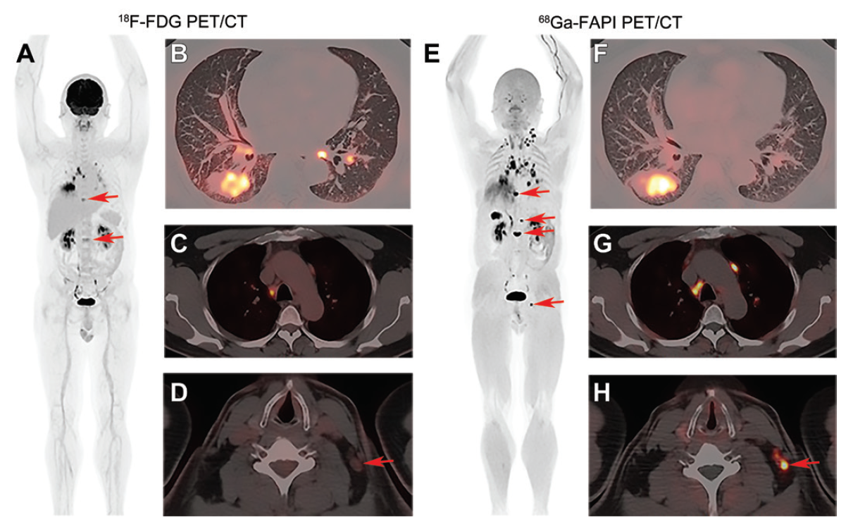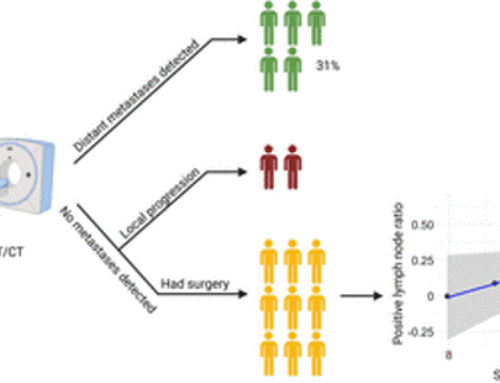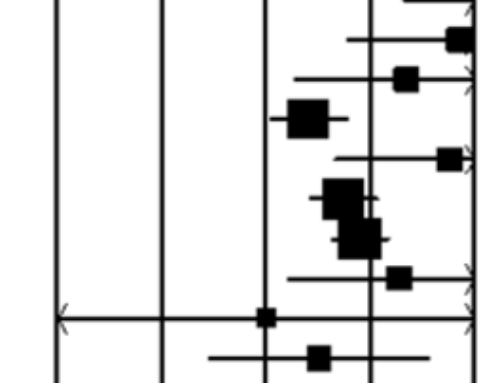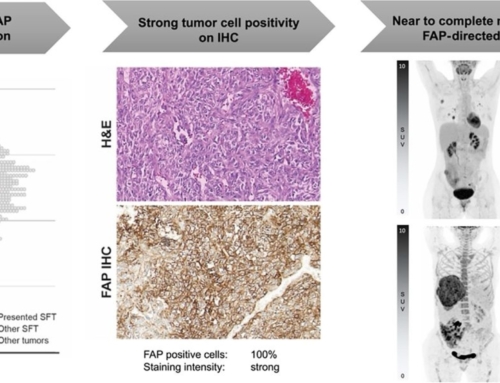Lijuan Wang, Ganghua Tang, Kongzhen Hu, Xinran Liu, Wenlan Zhou, Hongsheng Li, Shun Huang, Yanjiang Han, Li Chen, Jinmei Zhong, Hubing Wu
Abstract:Background Gallium 68 (68Ga)-labeled fibroblast-activation protein inhibitor (FAPI) has recently been introduced as a promising tumor imaging agent. Purpose To compare 68Ga-FAPI PET/CT with fluorine 18 (18F)-labeled fluorodeoxyglucose (FDG) PET/CT in evaluating lung cancer. Materials and Methods In this prospective study conducted from September 2020 to February 2021, images from participants with lung cancer who underwent both 68Ga-FAPI and 18F-FDG PET/CT examinations were analyzed. The tracer uptakes, quantified by maximum standardized uptake value (SUVmax) and target-to-background ratio (TBR), were compared for paired positive lesions between both modalities using the paired t test or Wilcoxon signed-rank test. Results Thirty-four participants (median age, 64 years [interquartile range: 46-80 years]; 20 men) were evaluated. From visual evaluation, 68Ga-FAPI PET/CT and 18F-FDG PET/CT showed similar performance in the delineation of primary tumors and detection of suspected metastases in the lungs, liver, and adrenal glands. The metabolic tumor volume in primary and recurrent lung tumors showed no difference between modalities (mean: 11.6 vs 10.8, respectively; P = .68). However, compared with 18F-FDG PET/CT, 68Ga-FAPI PET/CT depicted more suspected metastases in lymph nodes (356 vs 320), brain (23 vs 10), bone (109 vs 91), and pleura (66 vs 35). From semiquantitative evaluation, the SUVmax and TBR of primary or recurrent tumors, positive lymph nodes, bone lesions, and pleural lesions at 68Ga-FAPI PET/CT were all higher than those at 18F-FDG PET/CT (all P < .01). Although SUVmax of 68Ga-FAPI and 18F-FDG in brain metastases were not different (mean SUVmax: 9.0 vs 7.4, P = .32), TBR was higher with 68Ga-FAPI than with 18F-FDG (mean: 314.4 vs 1.0, P = .02). Conclusion Gallium 68-labeled fibroblast-activation protein inhibitor PET/CT may outperform fluorine 18-labeled fluorodeoxyglucose PET/CT in staging lung cancer, particularly in the detection of metastasis to the brain, lymph nodes, bone, and pleura. © RSNA, 2022 Online supplemental material is available for this article. See also the editorial by Jacobson and Van den Abbeele in this issue.


![FAP Expression in Renal Tumors Assessed by [68Ga]Ga-FAPI-46 PET Imaging and FAP Immunohistochemistry: A Case Series of Six Patients](https://sofie.com/wp-content/uploads/2025/12/info.ibamolecular-scaled-500x383.jpg)


![[68Ga]Ga-API-46 PET accuracy for cancer imaging with histopathology validation: a single-centre, single-arm, interventional, phase 2 trial](https://sofie.com/wp-content/uploads/2025/09/image-500x383.png)
